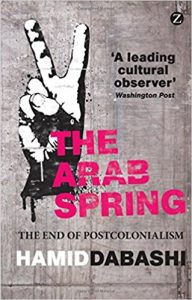On this Theme Thursday we move from literary revolutionaries in Latin America to political revolutions in the Middle East. Arab Spring refers to the democratic uprisings that arose independently and spread across the Arab world in 2011. The movement originated in Tunisia in December 2010 and quickly took hold in Egypt, Libya, Syria, Yemen, Bahrain, Saudi Arabia, and Jordan.
Check out these texts, available from Ames, to learn more about this series of political movements that swept the Middle East.
The Arab Spring: The End of Postcolonialism
This pioneering explanation of the Arab Spring will define a new era of thinking about the Middle East. In this landmark book, Hamid Dabashi argues that the uprisings occurring from Morocco to Iran and from  Syria to Yemen have been driven by a delayed defiance that signifies no less than the end of postcolonialism. As he brilliantly explains, the permanent revolutionary mood has the potential to liberate not only those societies already ignited but ultimately many others as well.
Syria to Yemen have been driven by a delayed defiance that signifies no less than the end of postcolonialism. As he brilliantly explains, the permanent revolutionary mood has the potential to liberate not only those societies already ignited but ultimately many others as well.
Voices of the Arab Spring: Personal Stories from the Arab Revolutions
Narrated by dozens of activists and everyday individuals involved in the Arab Spring, this book documents the unprecedented events that led to the collapse of dictatorial regimes in Tunisia, Egypt, Libya, and Yemen. Arab citizens were called to join the revolt during the second half of 2011, while the revolutionary moment was still unfolding. Their stories offer unique access to the message that inspired citizens to act, their experiences during revolt, and the lessons they learned from some of the most dramatic changes and appalling events to occur in the history of the Arab world. The riveting, revealing, and at times heartbreaking stories in this volume also include voices from Syria. Featuring participants from a variety of social and educational backgrounds and political commitments, these personal stories of action represent the true phenomenon of the Arab Spring’s united though broad social movements, collective identities, and youthful character. For years, these participants lived under regimes that brutally suppressed free expression and protest. Their testimony speaks to the multifaceted emotional, psychological, and cultural factors motivating citizens to join together and fight, putting a human face on events that might seem abstract or impersonal to many in the West.
The Transition Towards Revolution and Reform: The Arab Spring Realised?
The Arab Spring created a transition toward democracy for the peoples of Tunisia, Egypt, Morocco and Jordan, who initially elected moderate Islamist parties to lead them out of economic deprivation and corruption. This study looks at the relative success of the move to democracy in these four Middle Eastern countries, comparing the secular leaders of Tunisia and Egypt and their desire for revolution with the monarchs of Morocco and Jordan and their priority of reform.
Arab Spring: Negotiating in the Shadow of the Intifadat
Beginning in January 2011, the Arab world exploded in a vibrant demand for dignity, liberty, and achievable purpose in life, rising up against an image and tradition of arrogant, corrupt, unresponsive authoritarian rule. These previously unpublished, country specific case studies of the uprisings and their still unfolding political aftermaths identify patterns and courses of negotiation and explain why and how they occur. The contributors argue that in uprisings like the Arab Spring negotiation is “not just a ‘nice’ practice or a diplomatic exercise.” Rather, it is a “dynamically multilevel” process involving individuals, groups, and states with continually shifting priorities-and with the prospect of violence always near. From that perspective, the essaysits analyze a range of issues and events-including civil disobedience and strikes, mass demonstrations and nonviolent protest, and peaceful negotiation and armed rebellion-and contextualize their findings within previous struggles, both within and outside the Middle East. The Arab countries  discussed include Algeria, Bahrain, Egypt, Libya, Morocco, Syria, Tunisia, and Yemen. The Arab Spring uprisings are discussed in the context of rebellions in countries like South Africa and Serbia, while the Libyan uprising is also viewed in terms of the negotiations it provoked within NATO. Collectively, the essays analyze the challenges of uprisers and emerging governments in building a new state on the ruins of a liberated state; the negotiations that lead either to sustainable democracy or sectarian violence; and coalition building between former political and military adversaries.
discussed include Algeria, Bahrain, Egypt, Libya, Morocco, Syria, Tunisia, and Yemen. The Arab Spring uprisings are discussed in the context of rebellions in countries like South Africa and Serbia, while the Libyan uprising is also viewed in terms of the negotiations it provoked within NATO. Collectively, the essays analyze the challenges of uprisers and emerging governments in building a new state on the ruins of a liberated state; the negotiations that lead either to sustainable democracy or sectarian violence; and coalition building between former political and military adversaries.
Arab Spring in Egypt: Revolution and Beyond
This study examines the background to the 2011 uprising in Egypt, the limits of authoritarian rule and the rise of new secular movements. It studies the group dynamics of workers, young people, and women, evaluates the role of the military, and considers the impact of regime change and future prospects for pan-Arabism.
